Holistic and Transformational Learning
The new Tasmanian Post Year 10 Curriculum Framework has just been released on CD. According to the overview document the Framework"reflects an ‘holistic’ view of learners and learning with the experience of learning needing to extend beyond the informational to the transformational."
 Our school curriculum team is now 6 months into planning for implementation. I thought I'd see if some of the current projects do indeed reflect an 'holistic' view and extend to the 'transformational'.
Our school curriculum team is now 6 months into planning for implementation. I thought I'd see if some of the current projects do indeed reflect an 'holistic' view and extend to the 'transformational'.Project 1: New ICT Tools
 This project is introducing a number of social software and presentation tools to students and teachers including blogs, podcasting, personal learning environments and digital story telling.
This project is introducing a number of social software and presentation tools to students and teachers including blogs, podcasting, personal learning environments and digital story telling.Do these tools enable holistic approaches to learners and learning? I think they could do... at least in the sense of students being able to express themselves through different media and teachers being able to have a fuller more inclusive view of the whole student. Jack Miller defines holistic curriculum in terms of inclusiveness, connection and balance. Social software certainly provides connections from local to global levels and I think it can also give a better balance between Miller's tensions of individual/group, content/process and assessment/learning.
Do these tools enable transformation? Some describe these tools as "disruptive technologies" - I prefer the term 'transformational technologies' but I strongly agree. I think these tools can transform the relationship between learner and teacher, can transform how students access and undertake their own learning, and can transform a student's understanding of their place in the world.
Is it working? Still too early to tell... about 15% of teachers are now using at least one tool in their classes and feedback has been very positive but we have a long way to go. 10 copies of Will Richardson's book (pictured) have been placed across the campus for teachers.
Project 2: Academic Achievement and Personal Enrichment
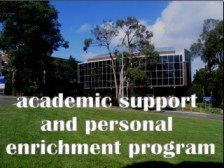 This project is providing support to a group of 60 students who are on traditional highly academic pathways. It aims to provide a learning space where students can learn together while at the same time challenging their assumptions and extending their involvement in 'non-academic' activities.
This project is providing support to a group of 60 students who are on traditional highly academic pathways. It aims to provide a learning space where students can learn together while at the same time challenging their assumptions and extending their involvement in 'non-academic' activities.Holistic approach? Yes - this is an explicitly stated aim - to get these students to experience and express a more holistic sense of self including the physical, mental, social and spiritual.
Transformational? One part of the project that is well attended are sessions looking at enigma and anomalies (such as the evidence for advanced pre-historical civilizations) which attempts to question fundamental assumptions and worldviews based on transformative learning theory.
Is it working? Early feedback from students would indicate that it is achieving these intended outcomes. One student wrote
"The Tuesday afternoons sessions have helped me to learn a lot about myself and others. I love learning about how people think, interact and learn. Knowing these things has changed the way I perceive myself, my education and others. I always leave the sessions deep in thought with the inspiration for further investigation."
Project 3: Lo-Tech Metal Fabrication
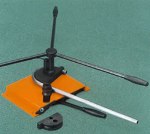 This project is providing safe and easy access to metal work equipment for students across the college. The aim is to enable visual and performing arts students to integrate metal work into their projects without the need for training in welding and drilling.
This project is providing safe and easy access to metal work equipment for students across the college. The aim is to enable visual and performing arts students to integrate metal work into their projects without the need for training in welding and drilling.Holistic approach? Not really... this is more about integrating skills from different subject areas.
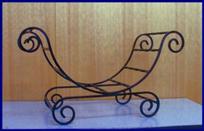 Transformational? One aim is to encourage more females to consider metal work so in this sense there may be an element of transformation of the perception of metal as a male only domain.
Transformational? One aim is to encourage more females to consider metal work so in this sense there may be an element of transformation of the perception of metal as a male only domain.Is it working? This project is still being set up with the equipment that has just been purchased.
Project 4: Human Powered Vehicle
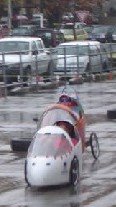 This project aims to design, build and race a three wheeled human-powered vehicle. Students from Material, Design and Technology will work with students from Physical Education to measure the vehicles performance and race it in local and inter-state competitions.
This project aims to design, build and race a three wheeled human-powered vehicle. Students from Material, Design and Technology will work with students from Physical Education to measure the vehicles performance and race it in local and inter-state competitions.Holistic approach? Yes in the sense that students will consider all aspects of this project and it will involve their physical, mental, emotional and social skills.
Transformational? This project aims to transform student attitudes to learning, empowerment and collaborative designing, making and appraising.
Is it working? Too early to tell - just in design stage...
Project 5: Integral Worldviews
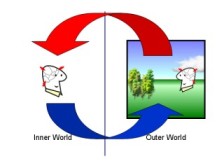 This project introduces students to aspects of Integral Theory in an attempt to help them develop coherent conceptual frameworks that help them understand how values, assumptions and worldviews colour our perceptions.
This project introduces students to aspects of Integral Theory in an attempt to help them develop coherent conceptual frameworks that help them understand how values, assumptions and worldviews colour our perceptions.Holistic Approach? Integral Theory by its very nature takes an holistic approach to human nature and knowledge.
Transformational? Students have reported that an integral approach does help them see things in new ways. Two students reported
"Openly challenged my way of thinking and what I personally believed in and accepted. Over-all very interesting and informative."
"Really insightful. Made me think life was more interesting… more to it."Is it working? This project has been running for over a year and student feedback has been very positive.
Labels: holistic, ICT tools, integral, transformation




3 Comments:
Hi Roger,
Just wondering how the post Yr 10 review will accommodate the Federal Education Minister's call for a Australian Certificate of Education, with an A to E assessment?
Also, Holistic education can only work if you have 'the basics'. These need to be taught explicitly.
Anain, if al teachers were professionals, and took their jobs as vocations, perhaps all taechers would teach holistically anyway.
How dio you teach literacy holistically when all the research (includuing the Australian Sentate inquires in the taeching of literacy and HNS literacy development suggest that explicit teaching of phonics need to be part of the whole literacy package.
You would think this is comon sense, but obviously many taechers got on the whole language bandwagon and I am now puting up with this poor teaching strategy in further education, were many younger students can't spell, use correct grammar or comprehend a thing. (or a work ethic).
This is not only occuring in Tasmanian, collegues in mainland universities have to mark assigments on content, as the grammar etc id discusting.
Only my thoughts and observation.
Don't mind mine spelling, grammar.
I must have just left year 12.....
Hello anonymous.
Assessment: You will need to contact the DoE PY10 Officers for information on this...
Holistic: This includes the basics and the relationships between the basics and more... A key question here is exactly what are 'the basics' for living and working in the 21st century?
And yes I think we need a variety of approaches that include explicit teaching.
I think several Australian States and the Australian Council of Deans of Education have written good documents on this: Queensland's New Basics, Tasmania's Essential Learnings, the Deans' New Learnings... etc.
These include references to the many literacies that students need for the 21st century...
Indeed the Generic Graduate Attributes being adopted by many Australian Universities also refer to these.
Hopefully the continued high level of collaboration between schools, tertiary education, business and the community will result in the educational provision required to meet the needs of all students for living, working and learning in this rapid period of societal change.
Post a Comment
<< Home